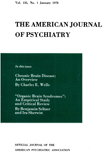Abstract
This is a long-term study of 34 peptic ulcer patients who have had repeated psychiatric and psychological evaluations. They have met the following criteria: a) peptic ulcer demonstrated by X-ray; b) under 60 years of age; and c) no other major physical disability.
All patients were evaluated before any of them had a gastrectomy. Subsequently 15 have had a gastrectomy and another 15 have continued on medical management, thus providing a control group which has not undergone gastrectomy and an experimental group which has had a gastrectomy. Four patients of the original group were eliminated from the study because of having had different procedures from the remainder.
Evaluations, both initial and follow-up, have consisted of psychiatric interviews and a psychological test battery consisting of the MMPI and the Cornell Medical Index. The patients have been evaluated yearly for a period of up to four years. At the follow-up evaluation an assessment is made of the patient's state of health as well as his home and job adjustment during the interval. It is determined whether or or not he still has ulcer symptoms, other symptoms subscribed to at the first interview, postgastrectomy symptoms or some totally new set of symptoms.
The results show that most patients (80 percent) in the nongastrectomy control group have recurrent ulcer symptoms. Only three of this group developed any new symptoms.
The gastrectomy group at follow-up, however, had no patients who complained of recurrent ulcer symptoms. Thirteen patients (87 percent) of the gastrectomy group complained of new symptoms, such as chest and back pain (two patients), abdominal cramping (two patients), easy fatigability (five patients), medically diagnosed hypertension (one patient), insomnia (two patients), "increased nervousness" (five patients), weight loss (two patients) and assorted other complaints such as decreased stamina, diarrhea, dizzy spells not related to meals and neck and back pain.
The data derived from the Cornell Medical Index indicate that the complaints of the nongastrectomy group remain fairly stable. The gastrectomy group initially had a decrease in complaints in regard to the gastrointestinal items which has subsequently in yearly follow-ups tended to return to the original level. Complaints in other areas of a psychoneurotic and psychophysiological nature tended to increase in the gastrectomy patients.
The MMPI data tended to indicate greater change in the gastrectomy group both in the direction toward more psychopathology and in the direction toward less psychopathology than any change noticed in the nongastrectomy group. The latter group tended to remain fairly stable. The MMPI profiles of the gastrectomy group tended to move back toward the original preoperative MMPI profile in subsequent years.
In regard to the new symptoms complained of by the gastrectomy group during the follow-up psychiatric interviews, it appears likely that gastrectomy with its relief of ulcer symptoms was instrumental in pushing these new symptoms into significance. It appears, therefore, that surgical treatment of the ulcer without treatment of the underlying anxieties and conflicts tends to result in the development of new symptoms which replace the functional role served by the ulcer symptoms in the maintenance of psychodynamic homeostasis.

